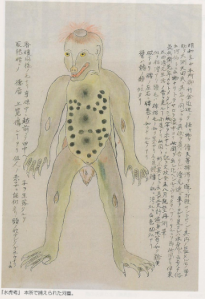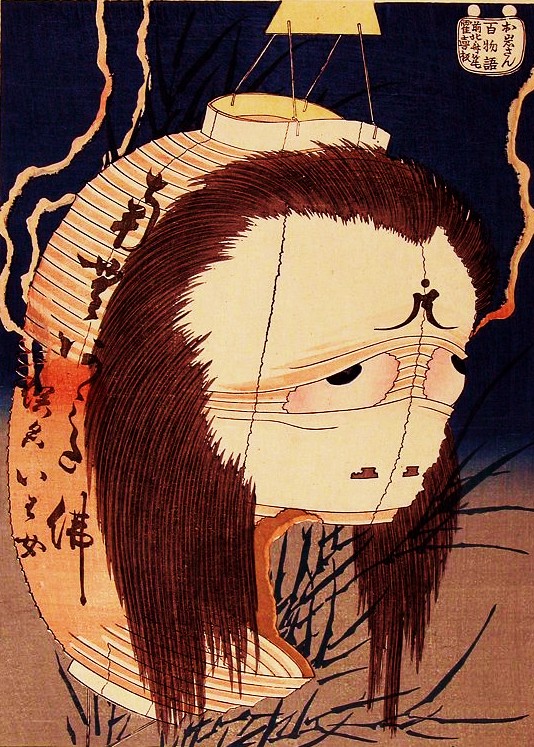There was a tanuki who sat under the edge of a porch and drummed on his belly. Such an interesting sight was bound to become the topic of the neighborhood. The house in question was in Honishi, and belonged to a hairdresser.
It all began one day in February, in the Eighth year of Meiji (1875) when a tanuki came running up to the house towards the backdoor, probably being pursued by a dog or something. The kind hairdresser allowed the tanuki to escape to a safety under his porch. That night, sitting on the back porch, the son of the hairdresser was mindlessly tapping out a rhythm on the hibachi stove, when from under the porch came an answering beat. The tanuki was drumming along with the boy on his own belly. This was just too much to believe, and the hairdresser summoned his neighbors to see if they too could hear the belly-beating tanuki. The tanuki went right along pounding out his tune; it didn’t stop even as night fell and darkness surrounded the village.
The hairdresser could not sleep that night due to the incessant drumming of the tanuki, and finally shouted “Enough!” He went outside to the tanuki and in a pleading voice said “Honorable tanuki, we are all trying to sleep, so could you please be quiet?” With this said the tanuki immediately stopped his belly-beating. The following day, a great crowd gathered at noon to listen again to the belly-beating of the tanuki, and were shocked and saddened to find that no more drumming came from under the porch ever again.
In another case, in the 15th year of Meiji, on July 28th, the Choya Shinbun newspaper published an article about a similar musical tanuki. Out near a rice field in a remote village, a samisen master was giving a lesson to his student when they both heard the unmistakable sound of someone accompanying them on what sounded like a hand-drum. Soon the master, student, and mysterious accompanist were playing along late into the night in a fantastic improvised session. With the coming of dawn, the drumming stopped as mysteriously as it had started.
That morning, the body of an ancient tanuki was found in the rice field by the man who attended the water wheel. The tanuki’s body had blood streaming from its mouth, and its belly was said to have been beaten bare as if it had been shaved. This took place in Kyoto, in the town of Aiiwa.
In one final story, in the 17th year of Meiji on the 28th day of May, the Yubin-Hoichi Shinbun newspaper reported that the wife of a photographer named Kyomizu from the Tokoku area kept a baby tanuki as a pet. The wife said that in the middle of the night she could hear the baby tanuki practicing beating out rhythms on its belly. The wife wanted to see what her pet was up to, and snuck in one night to spy on it. She said the baby tanuki was spread out flat on the tatami mats, with all four legs splayed wide and its nose pressed firmly on the ground. She could hear sounds of something like a flute and a hand drum coming from the tanuki. This story as been passed down by the people of Tokoku as a true story of magical tanuki.
There are many more such stories about the belly-beating of tanuki. It is a legend that will not vanish any time soon.





Recent Comments